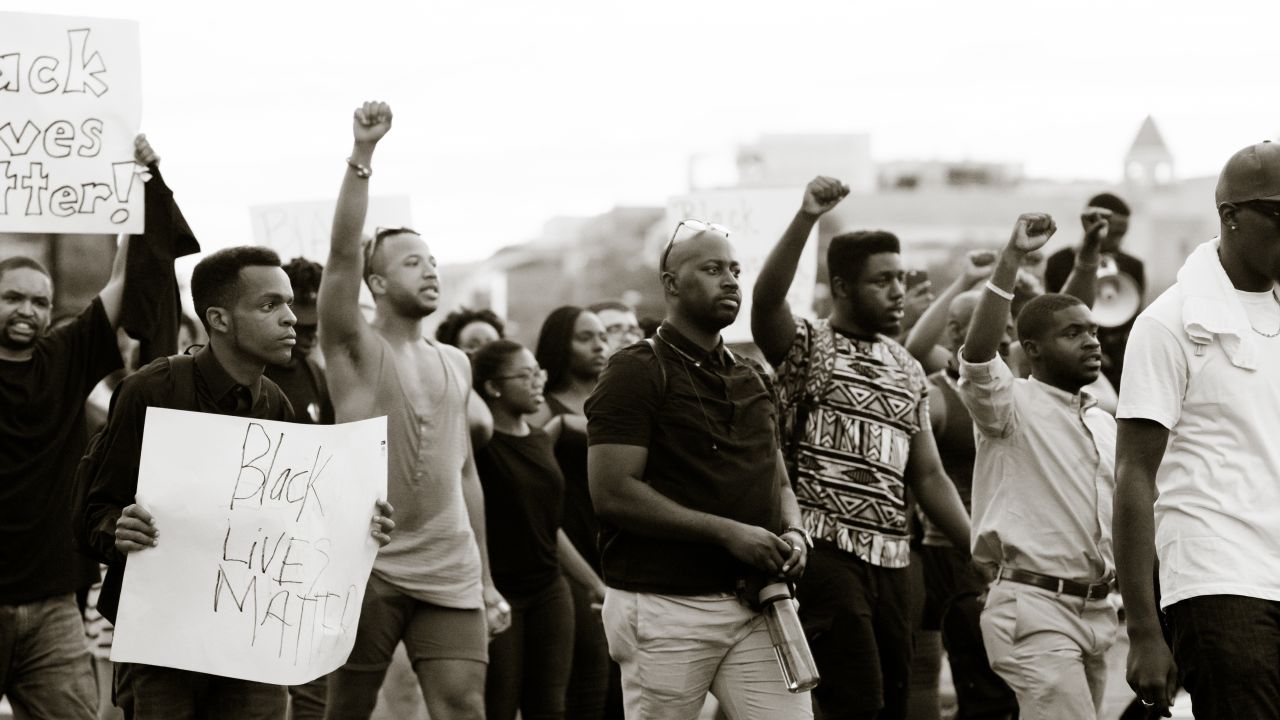
Black Lives Matter activists marching from the White House to the Capitol, July 14, 2016 (Photo: Victoria Pickering/ flickr CC 4.0).
This article first appeared in The New Republic.
The long-standing idea of paying reparations to Black Americans for the costs of slavery, segregation, and other racist policies has lately gotten a boost. President Joe Biden has endorsed a commission to study the subject, and on February 17 the House Judiciary Committee heard testimony on H.R. 40, which would create such a commission.
The purpose of the commission would be threefold: to examine the role of the federal and state governments in supporting the institution of slavery; to review forms of discrimination in the public and private sectors against freed slaves and their descendants; and to document lingering negative effects of slavery on living African Americans and society.
It goes without saying that the idea of somehow forcing the current generation of citizens to pay for policies that no living American was responsible for to Black Americans who may or may not be descended from slaves is very, very controversial—even in this magazine. Many people believe that the 140,414 Union soldiers who died on the Civil War battlefield paid the debt that was owed to the slaves, giving them their freedom. (The true death toll undoubtedly was much higher.) Abraham Lincoln said as much himself in his second Inaugural Address.
But this view clearly is wrong. If a mugger beat you up and caused you serious injury, you would hardly deem it sufficient for him merely to stop. To be made whole, you would need compensation as well as protection from further injury. All of our tort laws are based on this premise, and there is a vast system of personal injury lawyers, insurance companies, and courts that attempts to redress the harm that people incur from accidents, corporate malfeasance, and other suffering that can be traced to parties that are liable.
As Boston University law professor Keith Hylton has noted, “Slavery involves some obvious torts, such as assault and battery, conversion, and wrongful confinement. A person held as a slave today could surely collect damages.” But he also contends that after enough time has passed “tort doctrine shuts the door on compensation claims based on old and distant injuries.”
As a matter of litigation, I think it’s close to impossible to hold specific institutions liable for the harm done to specific individuals in the distant past. The courts have frowned on such efforts, although some institutions have made an effort to redress their own culpability. For example, Georgetown University has identified the names of slaves sold by the university in 1838 and pledged $400,000 per year to aid descendants of those slaves. The city of Rosewood, Florida, established a scholarship fund for descendants of a horrific 1923 massacre that destroyed the Black section of town.
In any event, the payment of reparations for past injury need not identify every individual who suffered or those responsible for the suffering. The government of West Germany paid reparations to the state of Israel to compensate for the Holocaust—and this has generally been considered a good-faith effort at least to acknowledge a harm that no amount of money could ever fully redress.
It should be remembered that litigation and debate over ancient debts are not uncommon. Greece still demands return of the Elgin Marbles, even though they have been in the British Museum’s possession since 1816. And there are many, many other artifacts and antiquities that sit in Western museums or private collections whose ownership is in question and whose return has been demanded. Unesco has a large program devoted to encouraging the repatriation of ancient artifacts to their countries of origin, no matter how long ago the initial transfer occurred.
More recently in history, the Nazis plundered artworks from Jews and others that have, over the years, become the property of those who may be unaware of their provenance. But periodically, heirs of the original owners track them down and demand their return. Such claims are not considered illegitimate merely because they are old.
But let us suppose, for the sake of argument, that the debt owed to the former slaves had been calculated contemporaneously but never paid. Would the fact that the debt wasn’t paid somehow cancel the debt? Of course not. It’s still there until paid or discharged through bankruptcy or other court judgment. As with claims to restore rightful ownership of stolen artwork, heirs could continue to pursue collection of that debt no matter how much time has passed.
It’s impossible to know what such a debt would be had it been acknowledged after the war or even who the litigants would have been then. Slaves could certainly sue their most recent owners, but they probably would have recourse as well against previous owners, slave traders, banks that financed such trade, and African tribal chiefs who sold them into slavery in the first place. Such a litigation would be complicated indeed. Some cases might succeed, but most would probably be doomed to fail because those liable were killed or bankrupted in the war.
The impediments to pursuing slavery litigation today are even more monumental. Proper records were never kept. Most slaves didn’t have official names or birth certificates; often they didn’t even know where they came from in the first place. They may have had very little idea who actually owned them. And calculating damages over centuries quickly runs into numbers in the trillions of dollars, when compound interest is included. This is simply not a practical avenue for redress.
It makes more sense to view the debt owed to the descendants of former slaves in moral terms—and to devise public policies that acknowledge the debt and make a reasonable effort to bring about some sort of compensation. Even if it comes nowhere near to making the descendants of slaves whole, as a tort case would, a reparations program can nevertheless help bring closure to the ugliest and longest-festering crime in American history.
One place to start is with General William Tecumseh Sherman’s famous Special Field Order No. 15 of January 16, 1865, which confiscated 400,000 acres of land in Georgia and promised 40 acres each to former slaves and their families. (The Confiscation Act of 1862 authorized land and other assets to be seized from those who supported the rebellion.) President Lincoln endorsed this order partly for the same reason he earlier issued the Emancipation Proclamation—it was militarily expedient. Many of the former slaves freed by Union armies were dependent on the Union for food, and it was in everyone’s interest for them to become self-sufficient as quickly as possible. The Freedmen’s Bureau was established in Washington on March 3, 1865, to expand the land redistribution.
Unfortunately, President Andrew Johnson halted Sherman’s policy and effectively ordered that the land be returned to its former owners. A legislative effort by Congress to provide public land to the former slaves was vetoed by Johnson in 1866. Sadly, Congress never returned to the issue, and the former slaves never got their land.
What would have happened if the former slaves had been given 40 acres and a mule? All of subsequent American history would have changed. The Black-white wealth gap would be sharply reduced, and the well-being of African Americans would have been materially improved. As the economist Sandy Darity of Duke University has written:
Had such a racial land reform taken place in the United States during the late 1860s, it is easy to envision that the vast current differences in wealth between blacks and nonblacks would not exist.… Indeed, had the promise of 40 acres been fulfilled, one can readily imagine a completely different U.S. history unfolding over the course of the subsequent century, a history in which race did not intertwine with dense inequalities.
Of course, counterfactual history is difficult to prove. But recent research supports Darity’s conclusion. Virginia Tech economist Melinda C. Miller looked at the situation in Oklahoma, where the Cherokee Nation enslaved a number of Blacks and also joined the Confederacy in 1861. After the war, the Cherokee agreed to provide free land for its former slaves. These former slaves were very much better off by 1900 than those elsewhere in the South. They had considerably more capital, both human and tangible, and suffered lower inequality.
It’s reasonable to assume that the principal opposition to slavery reparations today will come from Republicans, many of whom adamantly reject any interpretation of American history, such as the 1619 Project, that suggests collective guilt by white Americans. (Donald Trump set up a competing 1776 Commission that largely dismissed the problem of slavery.) However, there are Republicans who have endorsed the idea of reparations.
In 1988, President Reagan signed legislation paying reparations to survivors of the Japanese internment during the Second World War. When these funds were paid out in 1990, President George H.W. Bush wrote a letter of apology to the internees, saying,
We can never fully right the wrongs of the past. But we can take a clear stand for justice and recognize that serious injustices were done to Japanese Americans during World War II.
In enacting a law calling for restitution and offering a sincere apology, your fellow Americans have, in a very real sense, renewed their traditional commitment to the ideals of freedom, equality, and justice.
In 2001, the conservative columnist Charles Krauthammer succinctly stated the case for reparations. “The American people owe a special debt to black Americans,” he wrote. “The key word here is special. That debt does not apply to any of the other groups—women, Hispanics, now gays, etc.—that have been grasping for the prestige and special benefits of victimhood. The African American case is unique: There is nothing to compare with centuries of state-sponsored slavery followed by a century of state-sponsored discrimination.”
Krauthammer argued that affirmative action was a form of de facto reparations that worked very badly. A deal that paid African Americans a lump sum to compensate for slavery and discrimination but also abolished affirmative action might be a win-win policy, he said.
In 2004, in his race against Barack Obama for the U.S. Senate in Illinois, Republican Alan Keyes acknowledged that slavery “was an egregious failure on the part of the federal establishment.” He proposed that African Americans be exempted from federal income taxation for a generation or two as a form of reparations.
It’s doubtful that reparations will ever be paid—the cost would be deemed too high and the practical impediments to paying them would prove insurmountable, in my opinion. However, insofar as there is a moral debt that is at least acknowledged, the reparations debate may pave the way for policies that will help redress the continuing inequality of the races, diminish white resistance to race-centric policies, and encourage individual Americans and institutions to fulfill the ideals of a color-blind society. A national conversation on the subject is long overdue.




